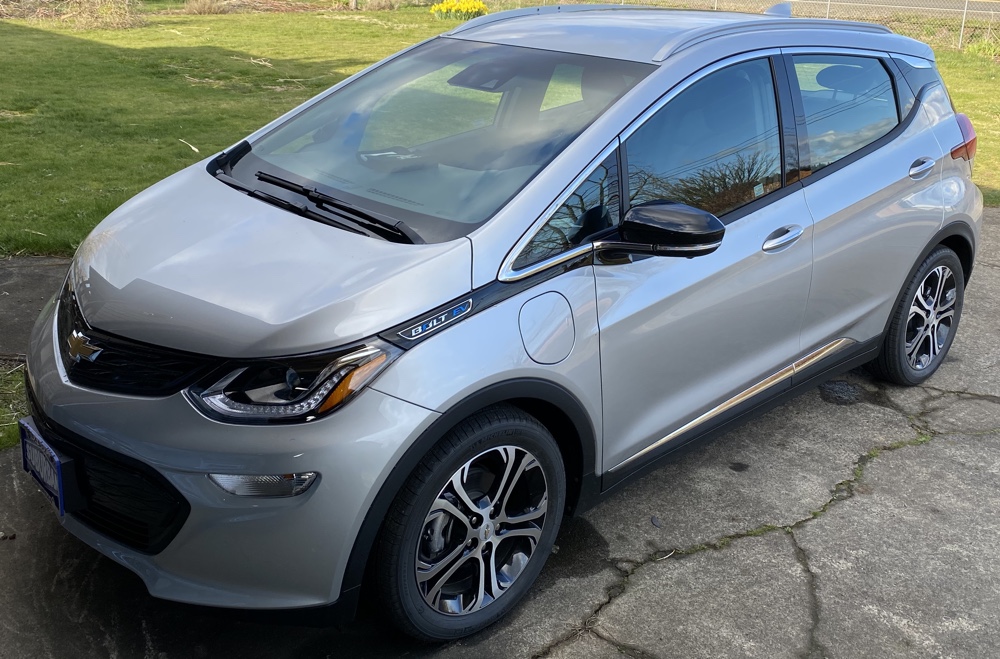By Melissa Wagoner
With the cost of gas soaring to well over $4 a gallon, more people than ever are considering an electric vehicle (EV) which, according to David Deckelmann – owner of a Nissan Leaf since 2019 – is a very good thing.
“I will always have a gas car because I love vintage cars,” Deckelmann, a self-proclaimed car enthusiast, said. Adding, “[And gas-powered vehicles] are an incredible feat. But it’s done. You knew it was real when all the major manufacturers got into it.”
“[I]t is exciting to see what they are innovating,” Dan Clements, owner of the Sin-able Sweets bakery in Mount Angel and an EV owner since he bought his first 2015 Chevy Spark, agreed.
For him, the battery range extension – which, in Chevy’s EVs, has increased 177 miles between 2015 and today – has been a game changer.

“While [the Spark] was an amazing car, it was very small and it only had a maximum range of 84 miles,” he said.
With a 100-mile-a-day commute, that battery capacity simply wasn’t enough. So, he upgraded to the 2021 Chevy Bolt with a 259-mile range.
“We simply plug in as soon as we get home,” he said, noting that the ability to charge overnight not only saves time – because he no longer needs to fill a gas tank one to two times each week – but he also saves money on both gas and electricity.
“Portland General Electric has a new plan that drops your overnight and weekend rate down to 6.2 cents per KWH,” he said, estimating the lowered cost to between 1.8 and two cents per mile when driving. “This is perfect for EVs since we normally charge overnight anyway and the car is topped off and ready to go each morning.”
But EVs aren’t without their issues. The first being – in the case of the Bolt and the Hyundai Kona – a recall on batteries that have been known to catch fire.
“[B]ut not only is GM addressing this, they’ve changed their battery technology and all the newer GM EVs will have different battery architecture to improve their reliability,” Clements said.
And EVs aren’t the only ones whose parts have been recalled.
“Every gas car we’ve ever owned has had a recall,” Deckelmann’s wife, Angela, pointed out.
In fact, it’s just one of the many misconceptions about EVs that she and her husband would like to dispel, starting with the controversy over environmental impact.
“Making a car is not environmentally friendly,” Deckelmann began. “It’s using natural resources. So, let’s agree that that’s a wash. But making energy at scale,” – through wind or water turbines or solar panels – “is always way more efficient than driving a car because internal combustion is so inefficient. Only 25 percent of the energy actually moves the car. The rest is just wasted.”
Which is where another common misconception, that EV drivers suffer from constant range-anxiety, comes in. Deckelmann theorizes that most car owners, used to an idling engine that continually uses fuel, simply aren’t used to an EV that, when the car stops moving, requires little to no power.
“When a car is idling it’s got to run all the bits and parts, costing you energy,” he said. He acknowledged that the difference is something car owners will simply have to get used to.
That, and a change in obtaining “fuel” which, in the case of EV cars, takes some getting used to. While the number of EV charging stations is growing, it’s not like there’s one on every corner. And “refueling” with a battery charge takes more time even once a station is located.
“You have to be in the right mindset to put up with the changing infrastructure,” Deckelmann pointed out. He listed apps like PlugShare and networks like Electrify America as two of his favorite resources when traveling.
Because EVs aren’t just for commuting or short trips.
“Many people drive around the country in their EVs with no issues,” Clements pointed out. “…There are many options for travel charging and that list is growing almost daily.”
So, too, are the innovations in the vehicles themselves. Reverse charging capabilities, portable battery options and towing capacity are now possibilities.
“The simple number of new models coming out as, or adding, an EV is huge,” Clements continued. “We actually leased our second EV in the family simply because in three years there’s going to be so many new EV options that we wanted a way to have our EV now (we got a Kia Niro… and love it) and then have all the new options in three years.”
He firmly believes that EV vehicles are something everyone should at least try.
“Do not be afraid of new and different,” he advised. “Go and test drive one. Go and look and see what rebates there are and how they apply to you. If you do not live in a single-family home that you own, see if you can have the landlord set up for a charging station, or at apartments, install charging stations (building owners often get tax credits for this, too)…
“It’s a fun new world in EV driving and you should check it out.”